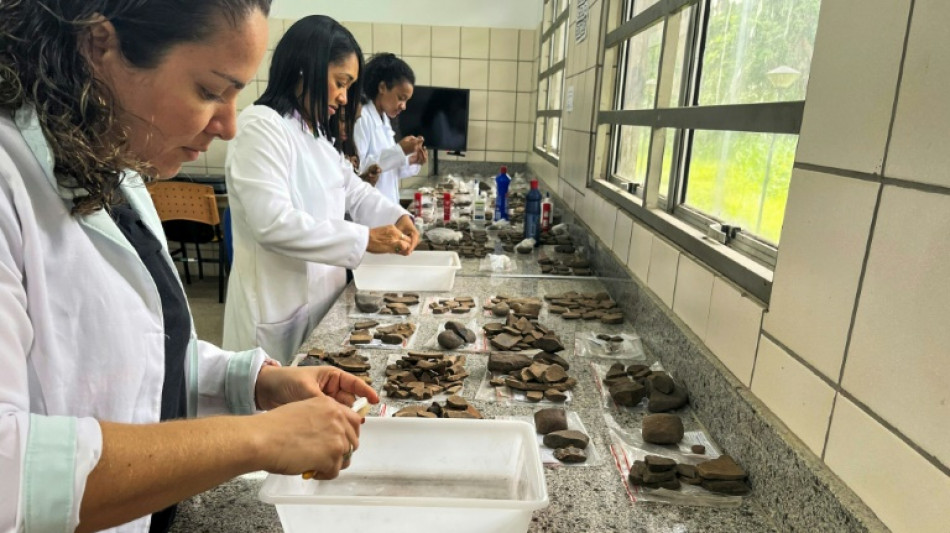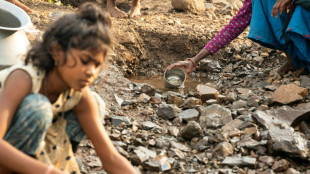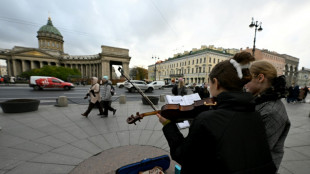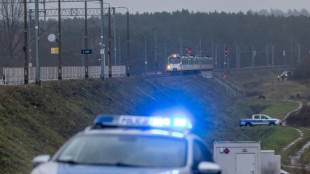
-
 North Korea says Seoul-US sub deal will trigger 'nuclear domino' effect
North Korea says Seoul-US sub deal will trigger 'nuclear domino' effect
-
Education for girls hit hard by India's drying wells

-
 Haitian gangs getting rich off murky market for baby eels
Haitian gangs getting rich off murky market for baby eels
-
Trump says will talk to Venezuela's Maduro, 'OK' with US strikes on Mexico

-
 Oscar Piastri wins Australia's top sports honour
Oscar Piastri wins Australia's top sports honour
-
'Severely restricted': Russia's Saint Petersburg faces cultural crackdown

-
 Polish PM denounces 'sabotage' of railway supply line to Ukraine
Polish PM denounces 'sabotage' of railway supply line to Ukraine
-
UK toughens asylum system with radical overhaul

-
 Carney's Liberals pass budget, avoiding snap Canada election
Carney's Liberals pass budget, avoiding snap Canada election
-
LeBron back in training, edges closer to Lakers return

-
 Climate talks run into night as COP30 hosts seek breakthrough
Climate talks run into night as COP30 hosts seek breakthrough
-
Germany and Netherlands lock up World Cup spots in style

-
 Germany's Woltemade hopes for 2026 World Cup spot after scoring again
Germany's Woltemade hopes for 2026 World Cup spot after scoring again
-
Germany 'send message' with Slovakia rout to reach 2026 World Cup

-
 Trump unveils fast-track visas for World Cup ticket holders
Trump unveils fast-track visas for World Cup ticket holders
-
Netherlands qualify for World Cup, Poland in play-offs

-
 Germany crush Slovakia to qualify for 2026 World Cup
Germany crush Slovakia to qualify for 2026 World Cup
-
Stocks gloomy on earnings and tech jitters, US rate worries

-
 'In it to win it': Australia doubles down on climate hosting bid
'In it to win it': Australia doubles down on climate hosting bid
-
Former NFL star Brown could face 30 yrs jail for shooting case: prosecutor

-
 Fate of Canada government hinges on tight budget vote
Fate of Canada government hinges on tight budget vote
-
New research measures how much plastic is lethal for marine life

-
 Mbappe, PSG face off in multi-million lawsuit
Mbappe, PSG face off in multi-million lawsuit
-
EU defends carbon tax as ministers take over COP30 negotiations

-
 McCartney to release silent AI protest song
McCartney to release silent AI protest song
-
Stocks tepid on uncertainty over earnings, tech rally, US rates

-
 Louvre shuts gallery over ceiling safety fears
Louvre shuts gallery over ceiling safety fears
-
'Stranded, stressed' giraffes in Kenya relocated as habitats encroached

-
 US Supreme Court to hear migrant asylum claim case
US Supreme Court to hear migrant asylum claim case
-
Western aid cuts could cause 22.6 million deaths, researchers say

-
 Clarke hails Scotland 'legends' ahead of crunch World Cup qualifier
Clarke hails Scotland 'legends' ahead of crunch World Cup qualifier
-
S.Africa says 'suspicious' flights from Israel show 'agenda to cleanse Palestinians'

-
 South Korea pledges to phase out coal plants at COP30
South Korea pledges to phase out coal plants at COP30
-
Ex-PSG footballer Hamraoui claims 3.5m euros damages against club

-
 Mbappe, PSG in counterclaims worth hundreds of millions
Mbappe, PSG in counterclaims worth hundreds of millions
-
Two newly discovered Bach organ works unveiled in Germany

-
 Stocks lower on uncertainty over earnings, tech rally, US rates
Stocks lower on uncertainty over earnings, tech rally, US rates
-
Barca to make long-awaited Camp Nou return on November 22

-
 COP30 talks enter homestretch with UN warning against 'stonewalling'
COP30 talks enter homestretch with UN warning against 'stonewalling'
-
France makes 'historic' accord to sell Ukraine 100 warplanes

-
 Delhi car bombing accused appears in Indian court, another suspect held
Delhi car bombing accused appears in Indian court, another suspect held
-
Emirates orders 65 more Boeing 777X planes despite delays

-
 Ex-champion Joshua to fight YouTube star Jake Paul
Ex-champion Joshua to fight YouTube star Jake Paul
-
Bangladesh court sentences ex-PM to be hanged for crimes against humanity

-
 Trade tensions force EU to cut 2026 eurozone growth forecast
Trade tensions force EU to cut 2026 eurozone growth forecast
-
'Killed without knowing why': Sudanese exiles relive Darfur's past

-
 Stocks lower on uncertainty over tech rally, US rates
Stocks lower on uncertainty over tech rally, US rates
-
Death toll from Indonesia landslides rises to 18

-
 Macron, Zelensky sign accord for Ukraine to buy French fighter jets
Macron, Zelensky sign accord for Ukraine to buy French fighter jets
-
India Delhi car bomb accused appears in court


Massive trove of ancient artifacts, skeletons found in Brazil
Workers were just starting construction on a new apartment complex in northeastern Brazil when they began finding human bones and pottery shards, their edges worn smooth by time.
Soon, excavations at the site in the coastal city of Sao Luis had uncovered thousands of artifacts left by ancient peoples up to 9,000 years ago -- a treasure trove archaeologists say could rewrite the history of human settlement in Brazil.
The lead archaeologist on the dig, Wellington Lage, says he had no idea what he was getting into when Brazilian construction giant MRV hired his company, W Lage Arqueologia, in 2019 to carry out an impact study at the site -- part of the routine procedure of preparing to build an apartment building.
Covered in tropical vegetation and bordered by the urban sprawl of Sao Luis, the capital of Maranhao state, the six-hectare (15-acre) plot was known as Rosane's Farm, for the daughter of a late local landholder.
Researching the site, Lage learned intriguing vestiges had been found in the area since the 1970s, including part of a human jawbone in 1991.
His team soon found much more: a flood of stone tools, ceramic shards, decorated shells and bones.
In four years of digging, they have unearthed 43 human skeletons and more than 100,000 artifacts, according to Brazil's Institute for National Historic and Artistic Heritage (IPHAN), which announced the discovery this week, calling it "grandiose."
Researchers now plan to catalogue the artifacts, analyze them in detail, put them on display and publish their findings.
"We've been working four years now, and we've barely scratched the surface," said Lage, a 70-year-old Sao Paulo native whose wife and two children are also archaeologists.
- Rewriting history -
The preliminary findings are already grabbing attention in the scientific community.
Lage says his team -- which grew to 27 people in all, including archaeologists, chemists, a historian and a documentary filmmaker -- has found four distinct eras of occupation at the site.
The top layer was left by the Tupinamba people, who inhabited the region when European colonizers founded Sao Luis in 1612.
Then comes a layer of artifacts typical of Amazon rainforest peoples, followed by a "sambaqui": a mound of pottery, shells and bones used by some Indigenous groups to build their homes or bury their dead.
Beneath that, around two meters (6.5 feet) below the surface, lies another layer, left by a group that made rudimentary ceramics and lived around 8,000 to 9,000 years ago, based on the depth of the find.
That is far older than the oldest documented "pre-sambaqui" settlement found so far in the region, which dates to 6,600 years ago, Lage said.
"This could completely change the history of not just the region but all of Brazil," he told AFP.
Scientists have long debated exactly when and how humans arrived in and populated the Americas from Asia.
Lage's find suggests they settled this region of modern-day Brazil at least 1,400 years earlier than previously thought.
- 'Landmark' -
Archaeologists now plan to date the artifacts more precisely using isotopic analysis.
Already, the site "represents a landmark in our understanding of prehistoric Brazil," IPHAN said in a statement.
"It's a testament to the long history of human settlement (in the region), demonstrating it predates what had previously been recorded in Brazil."
Archaeologist Arkley Bandeira of the Federal University of Maranhao, which is building a lab and museum to house the artifacts with funding from MRV, said in a statement the site could provide valuable new insights into the culture and history of ancient peoples lost to the past.
"These finds... play a crucial role in narrating our long history," he said.
K.AbuDahab--SF-PST




